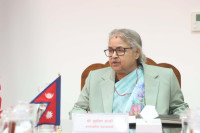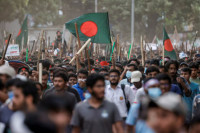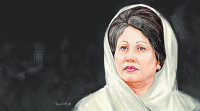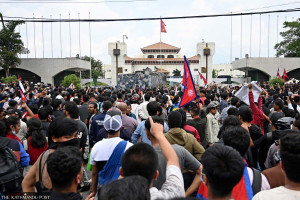Opinion
Stand together
The Madhes Andolan is an opportunity for us to push for transparent and inclusive political dialogues
Umanga Pandey
As Nepal is currently facing a humanitarian crisis, the UN recently called for international support. However, the world cannot save Nepal’s democracy which is slipping into chaos. It is only the Nepali people who can fix the political problems facing the country. As a new democracy, Nepalis are yet to internalise the fact that democracy is an ongoing process. At times, it feels as though if people were to obtain more petrol and cooking gas, many of us might even accept the rule by a benevolent dictator endorsed by India or China. But if we want to retain our freedom to determine how we want to live and prosper, and the liberty to pursue our dreams and aspirations, we must care about ‘how’ changes are brought about and not just the ‘what’ changes we want. If we want to strengthen democracy, we must insist in better processes, not just on the outcomes.
Political bullying
Might was right when the kings of the past imprisoned politicians; when the Maoist civil war was fought; when the People’s Movement cornered the ex-king; and when the constitution was drafted by suppressing various grievances—including those of the women, Hindus and Janajatis. And might is still right when agitations are suppressed and the border is blocked. Our history is filled with explicit tales of violence during revolutions and suppressions, and the implicit violence of bandh (strikes) and corruption. If we are to survive as a democracy, we must find a better way to challenge ideas than to allow the violent ways of contestations to persist.We must pressure the government to stop bullying the Madhes Movement through suppression and neglect, and we must ask organisers of the Madhes Movement to stop bullying the people all over the country through a blockade.
Earlier, politics was the exclusive domain of the king’s Durbar and his ‘bhai-bhardars’, now it belongs to ministerial Durbar with its ‘experts’. Constitutional experts who claim to have thoroughly read the statute, party members who arrange rallies and journalists who study political science claim politics to be their domain. Yet, the people who are the real owners of this democratic nation have quietly suffered through the decades of violence and uncertainty, and continue to withstand the onslaught of natural and political disasters with extraordinary communal-goodwill and resource-restrain. We, the people, must find ways to convert our inner reserves of strength into political resources. And while the people of the Tarai are doing just this, Nepalis across the world must unite to support their rights to be heard.
The constitution was drafted behind the closed doors. Even the drafters of the constitution reportedly did not have the time to read the final version. Those who supported its tenets of ethnic rights and secularism, federal structure welcomed it while others who disagreed kept quite. Either way, the people did not contest the non-transparency of the process. However, now we must demand transparency in political processes. We must push for a public discourse to educate us about the constitution and help us get involved in the process of contesting its ideas. In any case, democracy will only weaken further if the Madhesis’ voices are silenced through another closed-door deal among the leaders from Kathmandu and the Madhes.
Set a precedence
Kathmandu politicians having repeatedly dismissed Madhesi politicians by arguing that they are not the legitimate voice of the people in the plains. As a result, they have done nothing to address the concerns of Madhesis. We the people must support them in being heard by the political class in Kathmandu.
India claims that its unofficial blockade is a move to support the Madhes Movement. But there are many problems with this statement, not just for Nepal, but also for India. Yet, the Madhes Movement has to use their support, because the Nepali government would otherwise dismiss the movement. If Nepali citizens across the country were to support the Madhes struggle, the movement can afford to let go of Indian support, thus easing flow of goods. This would not only avoid the humanitarian crisis, but also set precedence on solving future political disagreements through non-violent means.
For that, we need not agree with the Madhes Movement’s demands regarding making specific changes to the constitution. We only need to agree on the belief that people should be able to demand changes without being treated as a criminal, or be muzzled, or worse, be killed. We must come together to end the process of secrecy, exclusivity and bullying as they suffocate the life out of democracy. If democracy survives, we will have many more opportunities to dispute our differences later.
Sadly, Nepal’s politicians, having removed the hereditary kings have established themselves as the elected kings. The challenge of defending democratic processes, therefore, falls upon us, the people. For that, we have to set aside our ideological differences, and come together as common people against the politics of secrecy, exclusivity and bullying. And the Madhes Andolan is an opportunity for us to push for transparent, inclusive and open dialogues. If the dissatisfactions of the Madhes are resolved on the basis of merit, and not through muscle power, we can establish a healthy precedence and revive democracy.
Pandey is an education-activist and was selected as an Asia 21 Youth Leader by the Asia Society in 2015




 5.4°C Kathmandu
5.4°C Kathmandu










%20(1).jpg&w=300&height=200)

